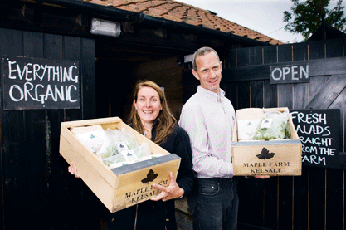FW Awards 2011: Local Food Farmer of the Year finalists – Miranda Kendall and Simon Gibson

At Maple Farm, Kelsale in Suffolk, creating a strong local brand to market added value produce from a sustainable farming system has been the aim of owner Miranda Kendall. Fifteen years ago this was a conventional combinable crop farm employing one person. Now a mixed, integrated organic holding, Maple Farm grows more than 50 cereal, vegetable, root and salad crops, produces free-range eggs, rare breed pork and employs 12 regular staff. Organic conversion was a gradual process and after a few years the farm had simply gone from being a conventional commodity crop producer to being an organic arable commodity producer, which simply added complexity, says Miranda. So, in 2006 it was decided to add value by establishing a brand for the local market, capitalising on a strong local food economy and on the marketing background of Miranda and her husband William. A modern stone flour mill was bought and now almost every tonne of cereals produced on the farm is either fed to its livestock or milled into flour. By-products from the mill are fed to the 1,000 hens, and most Maple Farm eggs are retailed at a significant premium and are the most expensive eggs in the local Waitrose. Miranda sticks fiercely to selling almost all produce within 20 miles of the farm. “We sell more than 80% of our produce within about 20 miles, another 15% is sold direct off the farm and only 5% goes further afield.” However, the ethos here is about much more than establishing a brand and a successful business. “Our vision is to turn a previously uneconomic farm into a profitable enterprise that plays a key role in the local community, providing local produce and employment,” she says, believing the Maple Farm model provides a blueprint for other family farms. Last year a small shop with an honesty box was opened in the yard and this regularly achieves sales of £300 a week, although in several recent weeks this has risen to £500. Manager Simon Gibson was appointed in 2008 with a brief to make the farm profitable while expanding the range. Three years later, the significant losses being suffered when he joined have been turned into a small profit and there is the prospect of real growth. Prior to Simon joining the business, a box scheme had done much to establish the Maple Farm name but this was discontinued because margins suffered through having to buy in produce from other growers to ensure variety. The farm now achieves the same vegetable sales through local outlets without the administrative burden of the boxes. Up to 4ha of high-value vegetables are grown in summer while the polytunnels produce high-value mixed organic salads in winter. Production must be planned carefully to avoid gluts. Dealing with a large number of customers also requires accurate financial and management information, as well as a practical approach to ordering, delivery and invoicing. In the past two years, staff costs have been reduced significantly while increasing turnover to more than three times that when the farm was producing purely organic cereals. Egg production efficiency has been markedly improved. Providing staff with financial information at the weekly meeting has transformed their approach, says Miranda. A quick chat with any member of the workforce leaves a clear impression of their enjoyment, commitment and expertise. Maple Farm takes every chance to get stories about the farm and its brand into local media, as well as meeting as many customers as possible, encouraging word of mouth recommendation and attending shows and farmers markets. They were early entrants to the original stewardship scheme, have subsequently taken up OELS and are considering HLS. Carbon footprint is minimised through organic production, encouraging local consumption and using a local workforce. Further sustainability measures include sheep wool insulation, rainwater harvesting, ground source heat-pumps and solar thermal power. Farm facts What the judges liked 2011 Farmers Weekly Awards
Miranda Kendall and Simon Gibson, Maple Farm, Kelsale, Suffolk
